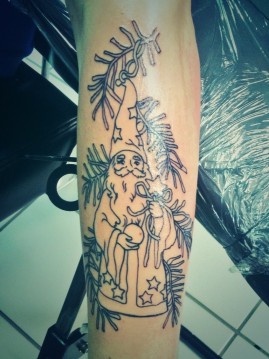
As an atheist who grew up in a nonreligious household that celebrated Christmas with gusto—for us it was about food, family, and Santa, but not about Jesus—I’ve always loved the holiday.
As a child this was partially due to the “magic” of the season—such as the year we found pieces of cotton strewn about the house, strategically placed where we would discover them, and speculated (at my mother’s suggestion) that they were in fact bits of Santa’s beard that had fallen off during his visit. But that aspect of Christmas always felt like a game, like make believe. The most important elements of Christmas were always the uninterrupted time with family, and the encouragement to slow down and express our love and appreciation for one another.
Now, as an adult, Christmas remains one of the most special days of the year for those exact same reasons (minus the “magic”)—enhanced by the fact that it’s usually the only time that my family is able to assemble from the various places we’ve relocated to.
Last year I wrote a short piece on Christmas and why it means so much to me as an atheist in spite of the false “War on Christmas” narrative. Here’s an excerpt:
[The] politicization of Christmas—a discourse often polarized by many believers, who use Christmas as an opportunity to exclude those who don’t share in their views, but also by some atheists—doesn’t account for those of us who see Christmas as [an invitation] to huddle together in the face of an all-too-often cold and dark world, relishing in good food, good music, and the company of good friends and family. And as an opportunity to help make a dark, cold world just a little warmer, a little brighter, and a little more inhabitable for others, through compassionate service or loving action.
As tomorrow is Christmas, I wanted to share a reflection I wrote about the last tattoo I got, which happens to be a Christmas tree ornament, and how this tattoo serves to remind me of the importance of warmth and compassion all year long:
Growing up nonreligious, I sometimes listened to the stories my religious friends were told about their identities and beliefs—stories that connected them to people who came before them—and found myself wondering if I was lacking something. But at such moments my thoughts would often turn to the stories I was told about my Grandma Judith, who died two days before my third birthday.
Read full post here.









